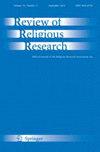Anticipating Sabbath Predicts Higher Quality Sleep: A Longitudinal Adventist Study
IF 1.7
1区 哲学
0 RELIGION
引用次数: 0
Abstract
High-quality sleep is essential for a healthy long life. Low-quality sleep is an unrecognized worldwide epidemic. To determine whether: (a) individuals who positively viewed that “the Sabbath brings rest” report higher-quality sleep in the future, (b) individuals who avoided secular activities on Sabbath report higher-quality sleep in the future, (c) moderation analysis identified the significant covariates effect of Sabbath rest on sleep disturbance, and (d) mediation clarified the covariate relationships of the two independent variables (Sabbath rest and secular activities). A generalized linear model was used for analysis. Multiple imputation was used for missing data. Less than 5% of total data was missing before imputation in this longitudinal, prospective-design study. Total sleep disturbance (TSD) in wave 2 predicted Sabbath rest from wave 1, p = .010. Results showed that participants who believed that “the Sabbath brings rest” had significantly less TSD overall, 4 years in the future. All ages, ethnicities, and genders benefited from Sabbath rest. None of the covariates lost significance for Sabbath rest. Anticipating a weekly Sabbath appears to improve longterm sleep quality, and therefore potentially contributes to long-term health benefits.期待安息日预示着更高质量的睡眠:一项纵向复临研究
高质量的睡眠对健康长寿至关重要。低质量睡眠是一种未被认识到的世界性流行病。为了确定:(a)积极认为“安息日带来休息”的个体未来是否报告更高质量的睡眠,(b)避免安息日世俗活动的个体未来是否报告更高质量的睡眠,(c)适度分析确定了安息日休息对睡眠障碍的显著协变量影响,(d)中介澄清了两个自变量(安息日休息和世俗活动)的协变量关系。采用广义线性模型进行分析。缺失数据采用多重插值。在这项纵向的前瞻性研究中,在输入之前,总数据的缺失率不到5%。波2的总睡眠障碍(TSD)预测波1的安息日休息,p = 0.010。结果显示,相信“安息日带来休息”的参与者在未来4年的总体创伤后应激障碍显著减少。所有年龄、种族和性别都受益于安息日休息。没有一个协变量对安息日休息失去意义。预计每周有一次安息日似乎可以改善长期睡眠质量,因此可能对长期健康有益。
本文章由计算机程序翻译,如有差异,请以英文原文为准。
求助全文
约1分钟内获得全文
求助全文
来源期刊

Review of Religious Research
Multiple-
CiteScore
2.50
自引率
20.00%
发文量
31
期刊介绍:
The Review of Religious Research (RRR) publishes empirical social science research on religion, primarily in sociology and social psychology and related fields of psychology, and scholarly literature reviews of research in these fields. RRR provides a forum for research across multiple disciplines and approaches, including research on the following topical areas: Clergy; Church programs; Comparative analyses of religious denominations and institutions; Denominational and congregational growth, decline, and vitality; Denominational and congregational conflict, competition, and cooperation; Ethnicity/race and religion; Generational and personal religious change; New religious movements; Personal spiritual and religious beliefs and practices; Religion and attitudes; Religion and family; Religion and gender, Religion and social behavior; Religion and well-being; and Research methodology. Among the characteristics that distinguish RRR from other academic journals on the study of religion are its applied focus and the opportunities it offers for academics and denomination-based researchers to share their findings with each other. RRR aims to facilitate the sharing and comparing of applied studies between denominational and academic researchers. RRR is the official quarterly journal of the Religious Research Association, Inc. RRR regularly publishes Original Articles, Research Notes, Review Articles, Applied Research Abstracts, and Book Reviews, and occasionally publishes articles on the Context of Religious Research. Applied Research Abstracts: This type of publication (previously called Denominational Research Reports) consists of a 350-550 word summary (without any references) of an applied research study in the form of a structured abstract, with the following section headings: Background, Purpose, Methods, Results, and Conclusions and Implications, followed by 3-4 keywords. The author may included a footnote that states: (a) whether a complete report exists and how it can be obtained; (b) whether the raw data are available in electronic form and how they can be obtained if the authors wish to make them available to other researchers; and (c) whether the authors would like to collaborate with other researchers to further analyze the data and write a full report for possible journal publication as a peer-reviewed manuscript. Such abstracts should be submitted to the journal editor for consideration for publication. Book Reviews: Unsolicited book reviews are not accepted for publication in RRR. If you would like to review a book for the journal, contact the Book Review Editor, David Eagle, Ph.D. – david.eagle@duke.edu Context of Religious Research: This journal heading covers items about awards and announcements, memoriams, and articles about the research process (e.g., articles on research methods and statistics, and profiles of denominational research organizations), as well as invited addresses to the Religious Research Association. Unsolicited articles should be submitted to the journal editor for consideration for publication. Original Articles: These are scholarly and methodologically sophisticated research studies: see Information for Authors on this website and the Submission Guidelines on the Springer RRR website for details (https://www.springer.com/13644) Reseach Notes: These are scholarly and methodologically sophisticated research studies: see Information for Authors on this website and the Submission Guidelines on the Springer RRR website for details (https://www.springer.com/13644) Review Articles: Authors should send an email to the journal’s editor describing the nature and scope of a proposed literature review to see if it is suitable for publication in RRR. See Information for Authors on this website and the Submission Guidelines on the Springer RRR website for details (https://www.springer.com/13644) The journal’s editor is Kevin J. Flannelly, Ph.D. – kjflannelly@gmail.com
 求助内容:
求助内容: 应助结果提醒方式:
应助结果提醒方式:


